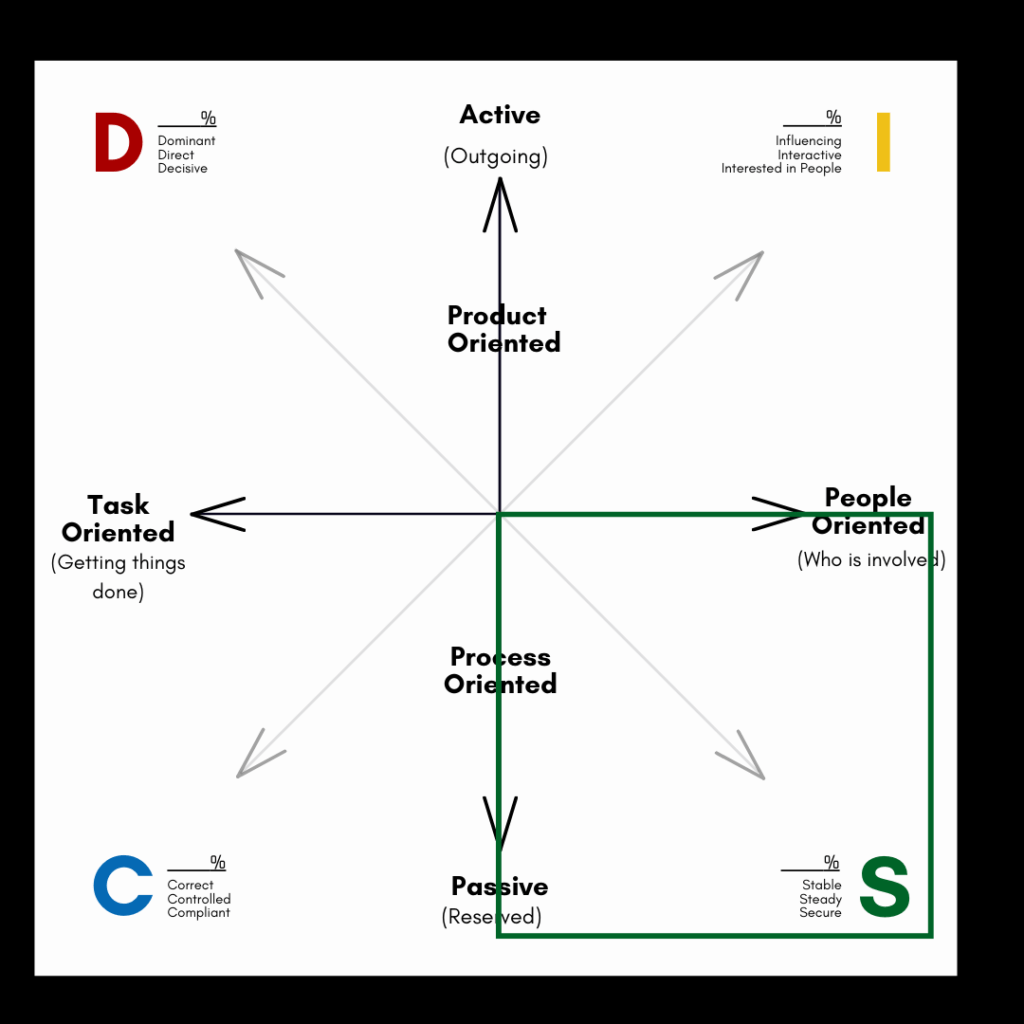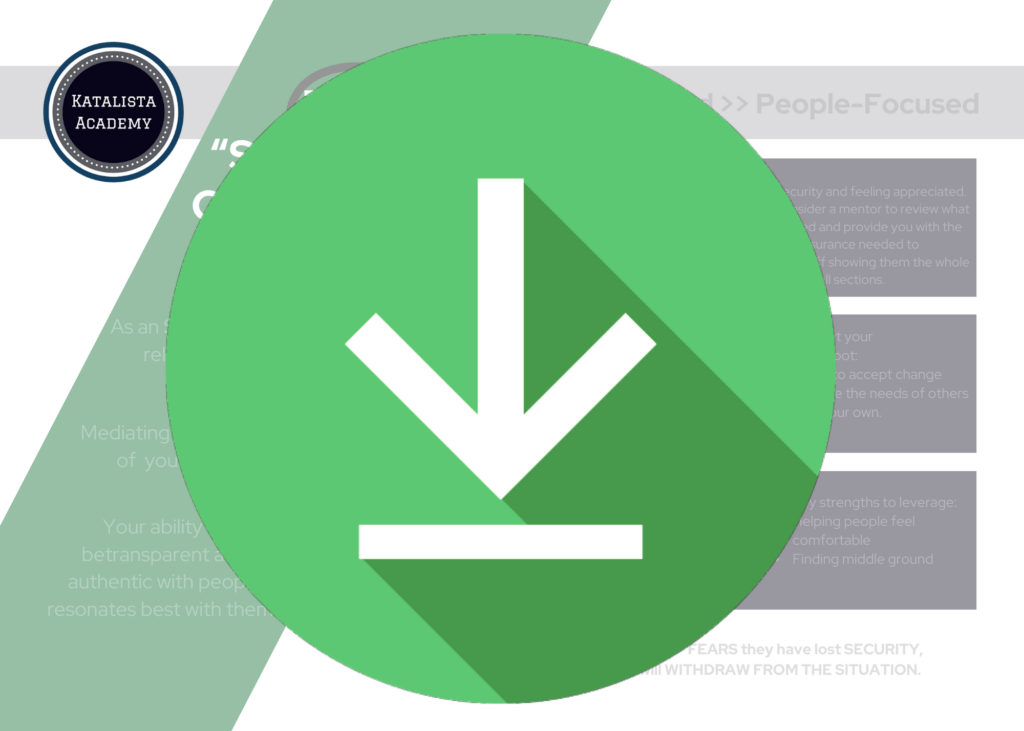The S Personality or “Supporter” is the most common of the four DISC communication styles.
They represent the vast majority at a whopping 69% of the population and are the most steady and even-keeled of all of the styles. My “High S” clients oftentimes have difficulty with change and spontaneity, and are the best listeners. Download this free “High S Personality Overview” to help identify this communication style better.
High S's are the best listeners...
I always found it a complete delight to work with High S co-workers and clients, but I would have a lot of difficulty with them as prospects early on in my career.
It took me some time to not only recognize the need for, but also learn how to properly implement a "nurture" strategy in my business process to successfully connect with my S-Type prospects. These are the people that know that the solution proposed is needed, but have difficulty signing on the dotted line because change is difficult for them to adapt to, so it takes some additional time and nurturing to move the dial.
Since both the High I and High S are on the "People-Oriented" Side of the DISC Behavior Quadrant, I always got along well with these personality types, but had a hard time understanding the High S's reluctance to change - even when they knew it was in their best interest.
High S Communicators are very steady and supportive individuals who are people-centric and passive communicators.
These personality types naturally gravitate towards team-oriented or supportive roles and are comfortable (and oftentimes prefer) following a leader. Change and spontaneity is difficult for them to accept and, in fact, makes them very uncomfortable.
Digging a little deeper…
Where “Supporters” can find themselves running into conflict is when they come across a “High D” communicators because they can be perceived as too unmotivated and blase.
S's are either well received (or not) by the other styles, and it is important for a Supporter communicatory to sharpen their “task-oriented” communication skills to enhance their personal and business relationships.
These personalities are oftentimes described as being excellent mediators, easy-going, and relaxed.
Check out this video about how dependability makes for the highest performing teams in the world!
Supporters are on the “People-Oriented” Right side of the DISC Quadrant - opposite to their “Task-Oriented” Counterparts - The “High D’s” and “C’s”.
This means that they show and perceive affection based on the ways that people make them feel.
(For example, a High “Supporter” personality may like things like: being recognized for their loyalty and dependability; being a great team player, having many close friends and relationships)

They are also on the “Process” side of the DISC Quadrant versus the “Product” side.
This means that they are more interested in hearing about the process towards the outcome far more than they are interested in hearing about the big picture ideas.
They very much value their relationships with others and will will want to make sure that there is genuine care and security to move forward with anything new or unfamiliar.
People who have a S-Type Personality make the other personality types feel more relaxed and at-ease. They make great mediators because of their likeable and diplomatic nature, however, can be difficulty to read and engage as prospective clients.
Although I can relate to a High S personality with their "people-oriented" nature, I sometimes have difficulty with reading them and getting them enthused about an idea. Since they are passive communicators, they are not as open or forthright in their communication as a High "I" or High "D" naturally is, and certainly not as enthusiastic as a High I generally is. They are far more on the quiet side and typically are not the first to voluntarily raise their hands up for leadership type of roles.
For my High S’s that have difficulty proactively having a conversation, check out this video:
By Celeste Headlee
Listen to my YouTube Supporter Playlist here:
Here’s a link to the Playlist on Spotify. Go check it out!
Check out these helpful resources:
Video of the Key Characteristics of a High S DISC Personality Type:
High S's are the most patient of the 4 DISC styles - learn how patience is a superpower here:
High S’s are represented by the color green. Check out the Supporter Wardrobe post to spruce up your ensemble.
Want to learn more about the High D Personality?
Learn about the High I Personality here:
Download My Communication Tips Card to effectively communicate with, or as, a High S
Think you Might Be a High s personality? Check out these Self-Care tips
Who do you know that’s very concise and correct? Find out more about the C Personality
Follow me on Instagram here:
Why I love working with my High S clients

You’re almost there!
Fill out the form below to get access to The Supporter Overview Download
We will never sell or give away your information, it is 100% safe and secure. It is a permission-only list and you can unsubscribe at any time.
Q: What are some typical strengths of High S Personalities?
A: High S Personalities excel at building relationships, maintaining harmony, and providing emotional support. They are often dependable and trustworthy.
Q: What challenges might High S Personalities face?
A: They may struggle with assertiveness, decision-making, or adapting quickly to change, as they prefer stability and routine.
Q: How can I effectively communicate with a High S Personality?
A: Be patient, empathetic, and open to listening. Avoid rushing them into decisions and provide reassurance when needed.
Q: Can High S Personalities be leaders?
A: Absolutely! They make excellent leaders who prioritize their team's well-being and ensure a harmonious work environment.
Stay in the Loop! Join Our Exclusive DISC Newsletter
Unlock Fresh Insights, Tips, and Updates Delivered Right to Your Inbox.

